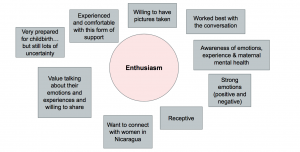The feedback from phase 1 was overwhelmingly positive… women were excited about our project and eager to share their experiences.
However, looking ahead to phase 2 in Nicaragua, we need to consider cultural differences that might affect our results. The group we spoke to in the U.S. was a support group, meaning that the women in it were there because they wanted to talk about their lives and feelings following the births of their children. They were very comfortable around us and happy to have their pictures taken. This is something that may not be the case in Nicaragua – some of the challenges that we anticipate may arise include:
- Shyness & the foreign nature of talking about maternal mental health may stifle conversation
- Open communication may be difficult outside the support group environment
- Potential language barrier
- Lack of literacy
- Lack of exposure to cameras / photography and resulting camera shyness
In order to best address these concerns, we will have to be careful, considerate, and culturally aware. We will need to carefully introduce the topics of conversation and be willing to listen without pushing for more. We will need to work in Spanish and come up with alternatives to writing down answers to questions, such as drawing, dictating, or pointing to a face. We will also need to be very gentle when encouraging them to let us take their pictures, reassuring them that they do not need to be photographed if they don’t want to be and making those who are photographed feel comfortable in front of a camera.
Our experience in the DHMC support group was so overwhelmingly positive. We understand that repeating this exercise in Nicaragua will not be without challenges, but we hope to see the same sort of openness and enthusiasm while abroad!

